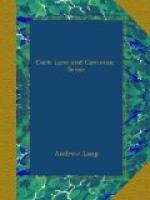In search of a cause, he turns to hallucinations. In certain or uncertain physical conditions, the mind can project and objectify, its own creations. Thus Gleditch saw the dead Maupertuis, with perfect distinctness, in the salle of the Academy at Berlin. Had he not known that Maupertuis was dead, he could have sworn to his presence (p. 866). Yes: but how does that explain volatile pots and pans? Well, there are collective hallucinations, as when the persecuted in the Cevennes, like the Covenanters, heard non-existent psalmody. And all witches told much the same tale; apparently because they were collectively hallucinated. Then were the spectators of the agile crockery collectively hallucinated? M. Littre does not say so explicitly, though this is a conceivable theory. He alleges after all his scientific statements about sensory troubles, that ’the whole chapter, a chapter most deserving of study, which contains the series of demoniac affections (affections demoniaques), has hardly been sketched out’.
Among accounts of ‘demoniac affections,’ descriptions of objects moved without contact are of frequent occurrence. As M. Littre says, it is always the same old story. But why is it always the same old story? There were two theories before the world in 1856. First there was the ‘animistic-hypothesis,’ ‘spirits’ move the objects, spirits raise the medium in the air, spirits are the performers of the airy music. Then there was the hypothesis of a force or fluid, or faculty, inherent in mankind, and notable in some rare examples of humanity. This force, fluid, agency, or what you will, counteracts the laws of gravitation, and compels tables, or pots, to move untouched.
To the spiritualists M. Littre says, ‘Bah!’ to the partisans of a force or fluid, he says, ‘Pooh!’ ’If your spirits are spirits, why do they let the world wag on in its old way, why do they confine themselves to trivial effects?’
The spiritualist would probably answer that he did not understand the nature and limits of spiritual powers.
To the friends of a force or faculty in our nature, M. Littre remarks, in effect, ’Why don’t you use your force? why don’t you supply a new motor for locomotives? Pooh!’ The answer would be that it was not the volume and market value of the force, but the existence of the force, which interested the inquirer. When amber, being rubbed, attracted straws, the force was as much a force, as worthy of scientific study, as when electricity is employed to bring bad news more rapidly from the ends of the earth.
These answers are obvious: M. Littre’s satire was not the weapon of science, but the familiar test of the bourgeois and the Philistine. Still, he admitted, nay, asserted strongly, that the whole series of ‘demoniac affections’ was ‘most worthy of investigation,’ and was ‘hardly sketched out’. In a similar manner, Brierre de Boismont, in his work on hallucinations, explains a number of ‘clairvoyant’ dreams, by ordinary causes. But, coming to a vision which he knew at first hand, he breaks down: ’We must confess that these explanations do not satisfy us, and that these events seem rather to belong to some of the deepest mysteries of our being’. {60} There is a point at which the explanations of common-sense arouse scepticism.




